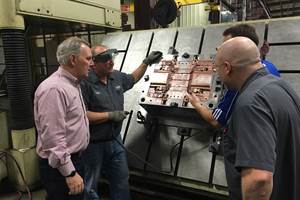TMA Notes on the May 21, 2002 U.S. International Trade Commission Hearing
On May 21 congressmen and industry representatives testified at the Washington DC U.S. International Trade Commission Public Hearing on Tools, Dies, and Industrial Molds.
On May 21 congressmen and industry representatives testified at the Washington DC U.S. International Trade Commission Public Hearing on Tools, Dies, and Industrial Molds: Competitive Conditions in the United States and Selected Foreign Markets. Industry advocates did an excellent job representing the status, the problems, the trends, and concerns of the die and mold industry.
Two congressmen presented first followed by a panel in the morning and a panel in the afternoon. Representatives of each panel presented prepared testimony of 5 to 10 minutes each for a total of 60 minutes in the morning and 75 minutes in the afternoon. The commissioners in both the morning and afternoon sessions followed prepared testimony by two hours of questions. Both panels presented both industry data as well as compelling anecdotal information that clearly explained the plight of the tooling industry in America. Association and coalition spokesmen populated panel 1 and individual employers served on panel 2.
National Tooling & Machining Association and American Mold Builders Association were both represented by association and company representatives. Tooling & Manufacturing Association was represented by TMA president, Bruce Braker.
TESTIMONY WAS PRESENTED BY:
The Honorable Donald A. Manzullo, U.S. Congressman, 16th District, State of Illinois
The Honorable Philip English, U.S. Congressman, 21st District, State of Pennsylvania
Panel 1 representatives in order of presentation were:
Olav L. Bradley, Chairman, Government Affairs, American Mold Builders Association and President of P.M. Mold Co., Schaumburg, IL
Bruce Braker, President, Tooling & Manufacturing Association
Matthew B. Coffey, President, National Tooling & Machining Association
John D. Belzer, President, TCI Precision Metals, Gardena, CA and Chairman of the Board, National Tooling & Manufacturing Association
Coalition of the Advancement of Michigan Tooling Industries
Dr. Jay Baron, Director, Manufacturing Systems Group, Center for Automotive Research, and President, Coalition for the Advancement of Michigan Tooling Industries
Michelle Cleveland, Vice President, The Right Place Economic Development Program of Greater Grand Rapids, and Vice President, Coalition for the Advancement of Michigan Tooling Industries
David L. Rasmussen, President, Progressive Die & Automation; President, Quality Die & Mold; Board of Directors, Coalition for the Advancement of Michigan Tooling Industries
Sanford "Sandy" Ring, Dykema Gossett, PLLC, Counsel to CAMTI
Panel 2 representatives in order of presentation were:
Jerry R. Lirette, President and Chief Executive Officer, D-M-E Company, Madison Heights, MI
Daniel W. Jepson, President, Jepson Precision Tool Incorporated, Cranesville, PA
Manfred Hoffmann, President and CEO, Caco Pacific Corporation, Covina, CA
Carl E. Jones, President, Penn United Technology, Incorporated, Saxonburg, PA
Michael Retzer, Controller, W. G. Strohwig Tool & Die Incorporated, Richfield, WI
Robert E. Smith, President, Forma Tool & Mold, Incorporated, Largo, FL
Joe Pedulla, Owner, Sandor Manufacturing Incorporated, Lawrence, MA
David R. Sandy, Vice President, Systems Group, M.S. Willett, Incorporated, Cockeysville, MD
Laurie Moncrieff, President and Owner, Schmald Tool & Die Incorporated, Burton, MI
Mark A. Hanaway, Marketing Director, Tech Tool & Mold, Inc. & Tech Molded Plastics, Meadville, PA
Mark A. Milbrandt, Plant Manager, Apollo Tool, Inc., Westfield, WI
Steve Zoumberakis, CEO and President, Quality Mold, Inc., Akron, OH
Steven R. Prahl, President, Trio Mold & Engineering, Inc., Greenville, MI
Mike Korneli, President, BesTech Tool Corporation, West Bend, WI
The presenters did an excellent job discussing the domestic and international issues that impact the mold and die industry. The commissioners listened carefully and responded with thoughtful and pertinent questions. Congressman Manzullo and Congressman English began testimony at 9:30 a.m. following by a PowerPoint presentation by Carl Jones, president of Penn United Technology, Incorporated. Mr. Jones explained the role of special tooling in the manufacturing process.
Representatives of AMBA, TMA, NTMA, and the Coalition for the Advancement of Michigan Tooling Industries (CAMTI), presented morning testimony. During the question and answer period following prepared testimony the panel fielded questions from the five commissioners. Company owners Olav Bradley, David Rasmussen, and John Belzer effectively fielded a number of questions from the company and industry perspective. Matt Coffey from NTMA who is wise in the ways of Washington DC and who has strong international experience with the International Special Tooling & Machining Association provided answers to numerous commission questions. Dr. Jay Baron, an expert on the automotive industry, fielded a number of questions related to that industry. TMA's Bruce Braker responded to questions on workforce and training issues. Michelle Cleveland explained that the tooling industry is critical to the economic health of many communities - contributing high wage jobs with a significant multiplier effect.
The afternoon session began with a presentation by D-M-E Company president Jerry Lirette. Mr. Lirette examined the results of a survey conducted by D-M-E online. Close to 1,000 companies responded. About 85% of respondents were plastic mold companies. Survey data shows a soft market for American built molds over the past five years with a steep drop in demand in 2001. The commission noted some differences between D-M-E data from 1997 to 2000 when compared to U.S. Census Bureau data-but nobody argued with the steep drop in demand for molds in 2001. Mr. Lirette maintained that the survey sample was sufficiently large to illustrate trends in the industry. Official government 2001 sales data for molds and dies is not yet available. Mr. Liratte presented a summary of the industry problems as identified by industry respondents along with some recommended solutions.
Following the D-M-E presentation employers on panel 2 were each given five to ten minutes to address the commission. A wide variety of domestic and international issues were discussed. The issue of competition with China was noted repeatedly. Clearly a huge number of U.S. assembly plants are migrating to China. This causes both tooling and part production opportunities to be lost in the U.S.
Regarding the issue of direct competition with China especially for molds, employer and association representatives noted that the current recession is causing many purchasers to look toward China in an effort to shop price. Even if the tooling program is retained in the U.S., the shopping trip to China tends to depress the price of American molds considerably below breakeven. The concern is that once China is able to satisfy the demand for molds within China they will be become even more aggressive in the export of molds to America. Even though the volume of molds flowing from China to America is relatively low today, the trickle is likely to turn to a flood in the near future.
FOLLOWING ARE SOME OF THE MANY ISSUES DISCUSSED:
Anecdotal data showed most companies represented at hearing experienced serious sales drops in 2001 and still have not recovered
Asian business model - shops are designed around customer needs - close tie and communications - more niche marketing in Asia
Asians and Europeans more economically patriotic
Better government support for Asians and Europeans
Changes in industry technology and availability of new technology worldwide
Commission asked, "What happens when a customer moves offshore?"
Commission asked, "What is impact of job loss on community?"
Consolidation and merger trends
Customers use China to beat down tooling price
Discussed various customer industry sectors and need for diversification of customer base
Difficulty working with lenders - great quote from Dave Rasmussen, "The banking community will give you an umbrella, but they'll take it away when it starts raining."
Government support for R&D stronger in other countries
High cost of benefits and high cost of regulatory compliance in this country
Incentives to "Buy American" components
Importance of value added manufacturing to U.S. economy
Issue of reduced apprentice training and reduced number of candidates and high school programs
Joint ventures
Must retain knowledge base for dies and molds in this country
Need to become lean
Need to equalize tariffs (reciprocal tariffs)
Noted that current China problem is primarily loss of assembly plants rather than direct import of molds and dies
Noted that even though ITC data shows nominal imports from China a number of anecdotal examples of Chinese tooling competition were presented
One presenter stated that Chinese charge is higher to American mold company than to molder (cutting mold company out of partnering opportunity)
Online bidding creates more international competition
Operating capital hard to finance more so than for purchase of hard assets
Opportunities to work for foreign auto transplants in U.S.
Overcapacity problem both in tooling and in manufacturing worldwide
Partnerships with foreign producers
Purchase orders and contracts, the way die and mold industry does business
Repair business vs. new tooling business
Steel tariff problem
Strong dollar problem mentioned repeatedly
Tooling import and export quantities
Trend toward less craft as industry become more "productionized"
Unsupportive government policies
Comments from commissioners included these quotes, "Alarming testimony" and "Anecdotal horror stories."
TMA thanks those association and industry representatives who took the time and committed the expense to represent their industry in Washington DC. The commission will continue to collect and examine information. An ITC survey will be conducted in about a month. Findings and recommendations will be published later this year. These notes were made by Bruce Braker, president of Tooling & Manufacturing Association in order to communicate a sense of what transpired at the hearing and are not intended to be a complete documentation of the hearing.
Bruce Braker
President
Tooling & Manufacturing Association
1177 S. Dee Rd.
Park Ridge, IL 60068
(847) 825-1120
www.tmanet.com
Related Content
OEE Monitoring System Addresses Root Cause of Machine Downtime
Unique sensor and patent-pending algorithm of the Amper machine analytics system measures current draw to quickly and inexpensively inform manufacturers which machines are down and why.
Read MoreSteps for Determining Better Mold Prices
Improving your mold pricing requires a deeper understanding of your business.
Read MoreThe Critical Role of Management Representatives in ISO 9001
In ISO 9001 quality management systems, the Management Representative (MR) plays a crucial role. While the 2015 version of ISO 9001 no longer mandates this position, having a trusted management member serve as an MR remains vital for streamlining operations and maintaining quality standards.
Read MoreThink Safety: Eliminate Hazards Throughout the Shop
The tooling community is taking advantage of new products for safer mold shops and molding facilities.
Read MoreRead Next
How to Use Continuing Education to Remain Competitive in Moldmaking
Continued training helps moldmakers make tooling decisions and properly use the latest cutting tool to efficiently machine high-quality molds.
Read MoreHow to Use Strategic Planning Tools, Data to Manage the Human Side of Business
Q&A with Marion Wells, MMT EAB member and founder of Human Asset Management.
Read More

















